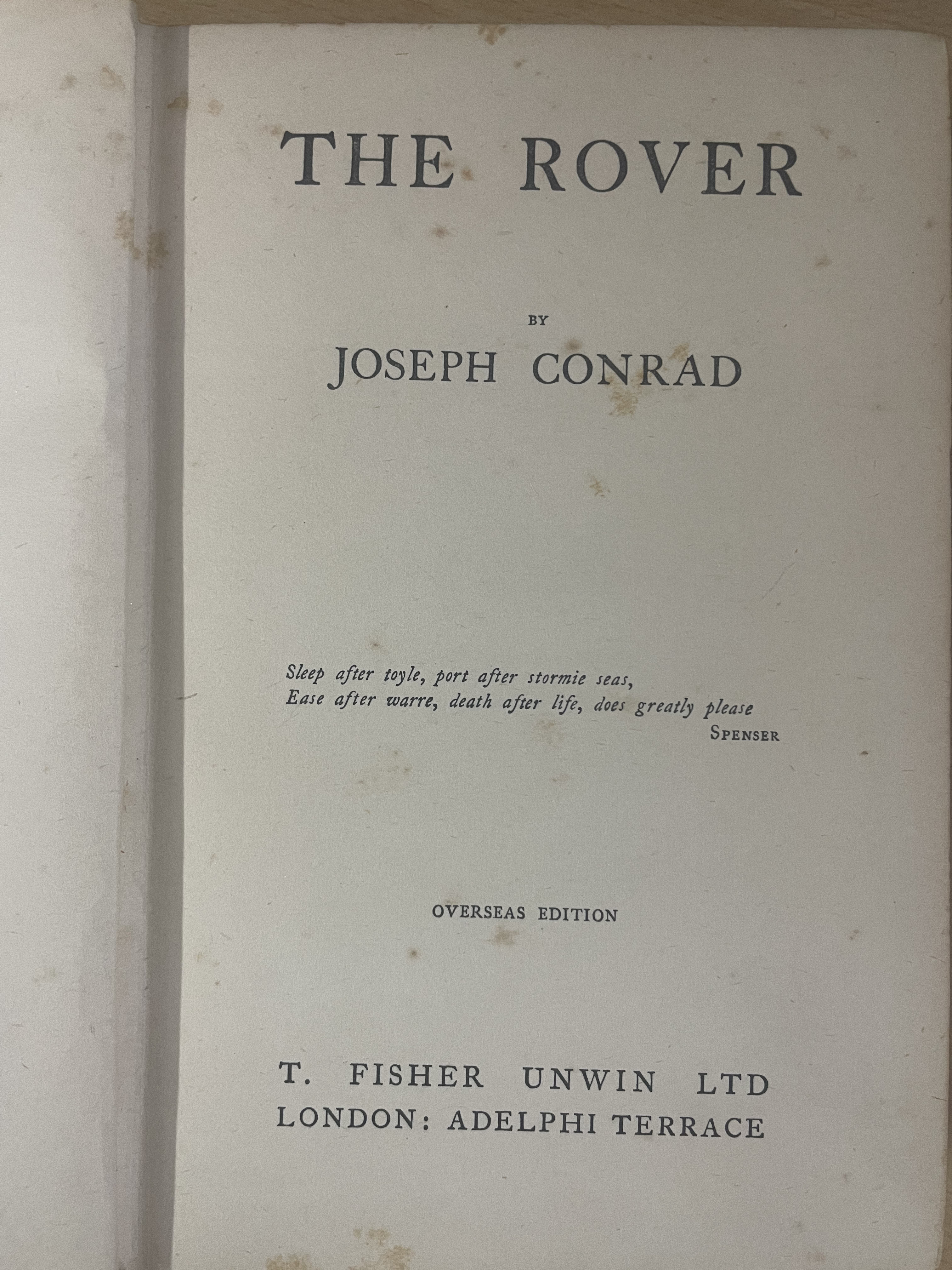The Rover

About
Summary
Exquisite
TOC
Details
Related
URL
Images
Overview
The Rover by Joseph Conrad, completed shortly before his death and published in 1923, is a novel set in post-Revolutionary France, focusing on themes of identity, duty, and the search for peace after a life of adventure.
The novel centers around Jean Peyrol, a seasoned sailor and former pirate, often referred to as a rover of the outer seas. After decades of a life filled with action and lawlessness, Peyrol returns to his native France seeking a quiet retirement1. He settles in a remote farmhouse called Escampobar, located on the Giens Peninsula near Hyères, overlooking the Mediterranean.
Peyrol intends to spend his remaining days in peace, rigging up a small boat for pleasure and enjoying the tranquility of the countryside. However, his hopes for an idyllic retirement are disrupted by the arrival of several characters and unfolding events.
Importance of Book
Conrad's Last Completed Novel: It represents the culmination of Conrad's literary career and offers a final glimpse into his recurring themes and narrative style.
Exploration of Conradian Themes: The novel revisits many of the themes that Conrad explored throughout his career, such as the complexities of human nature, the burden of duty, the allure of the sea, and the search for meaning in a chaotic world.
Character Study of Peyrol: The character of Peyrol is a compelling study of a man grappling with his past and seeking redemption or at least peace in his final years.
Historical Setting: The novel provides a vivid portrayal of post-Revolutionary France and the ongoing conflict between France and England, offering insights into the political and social climate of the time.
Key Themes
The Impossibility of Escape: Peyrol's attempt to escape his past and find peace proves to be elusive. He is ultimately drawn back into action and adventure, suggesting that some men are simply unable to escape their inherent nature.
Duty and Sacrifice: The novel explores the conflict between personal desires and the call of duty. Peyrol ultimately sacrifices his own chance at happiness to fulfill what he sees as his obligation to his country and to the young lovers, Real and Arlette.
The Search for Identity: Peyrol grapples with his identity as a sailor, a pirate, and a Frenchman. His final act suggests that he ultimately finds his true identity in embracing his adventurous spirit and serving a higher purpose.
The Allure of the Sea: The sea serves as a constant presence in the novel, representing both freedom and danger. It is the element to which Peyrol ultimately returns, suggesting its enduring power over his life.
Aftermath of Revolution: According to William Peace Blog, the immediate aftermath of the French Revolution is a key theme.
Cultural Significance
Exploration of Universal Themes: The novel explores timeless themes of identity, duty, and sacrifice that resonate with readers across cultures and generations.
Literary Impressionism: Conrad is considered a literary impressionist, and this novel demonstrates his style.
Historical Context: The novel provides a glimpse into a specific historical period and offers insights into the social and political dynamics of the time.
Legacy of Joseph Conrad: "The Rover" adds to the legacy of Joseph Conrad, one of the most important and influential novelists of the 20th century.
Effects on Society
Continued Interest in Conrad's Works: The novel helps to sustain interest in Conrad's broader body of work, encouraging readers to explore his other novels and short stories.
Discussion of Historical and Philosophical Themes: The novel prompts discussions about the themes it explores, such as the nature of duty, the legacy of colonialism, and the search for meaning in a complex world.
Appreciation for Literary Artistry: "The Rover" showcases Conrad's skill as a writer, his mastery of language, and his ability to create complex and compelling characters.
Reflection on Human Nature: The novel prompts reflection on the complexities of human nature, the choices people make, and the consequences of their actions.
Conclusion
The Rover is a nuanced and thought-provoking novel that offers a fitting conclusion to the career of one of the greatest writers in the English language. The book's protagonist was a liminal character. He seems to mimic Conrad himself in this regard.
While not his most celebrated work, it remains a valuable contribution to the literary landscape, exploring enduring themes and showcasing Conrad's unique narrative style.
Title
The Rover
Author
Joseph Conrad
Name of Publisher
T Fisher Unwin Ltd London
Publish Date
1923
Subject
Novel
Vintage
1901-1947
Edition
First
Number of Pages
317
Category
Literary
Sub Category
Fiction
Rarity
RARE
